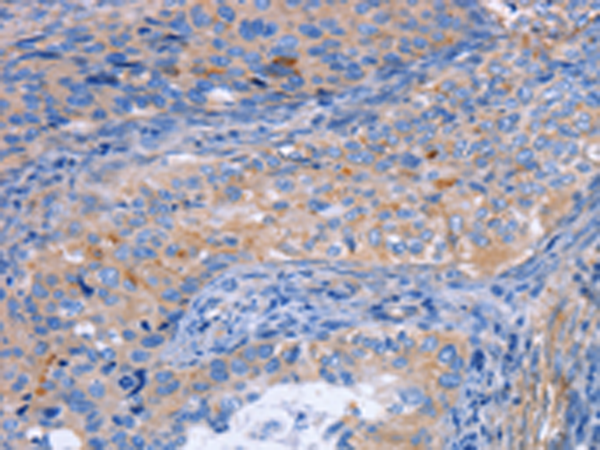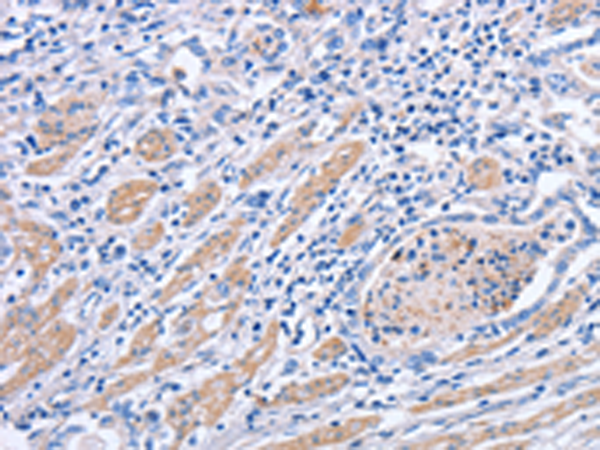

| WB | 咨询技术 | Human,Mouse,Rat |
| IF | 咨询技术 | Human,Mouse,Rat |
| IHC | 1/25-1/100 | Human,Mouse,Rat |
| ICC | 技术咨询 | Human,Mouse,Rat |
| FCM | 咨询技术 | Human,Mouse,Rat |
| Elisa | 1/1000-1/5000 | Human,Mouse,Rat |
| Aliases | HOA; OS2; EDM5; DIPOA; OADIP |
| Host/Isotype | Rabbit IgG |
| Antibody Type | Primary antibody |
| Storage | Store at 4°C short term. Aliquot and store at -20°C long term. Avoid freeze/thaw cycles. |
| Species Reactivity | Human, Mouse |
| Immunogen | Fusion protein of human MATN3 |
| Formulation | Purified antibody in PBS with 0.05% sodium azide and 50% glycerol. |
+ +
以下是与MATN3抗体相关的3篇文献摘要简述,供参考:
1. **"Matrilin-3 Role in Cartilage Development and Osteoarthritis"**
*作者:Chen H, et al.*
摘要:研究利用MATN3抗体进行免疫组化及Western blot,发现MATN3在软骨细胞外基质中高表达,并揭示其通过调控TGF-β通路影响软骨稳态,与骨关节炎的病理进展相关。
2. **"MATN3 Mutations Cause Autosomal Dominant Epiphyseal Dysplasia"**
*作者:Jackson GC, et al.*
摘要:通过患者样本分析,结合MATN3抗体的免疫荧光实验,证实MATN3基因突变导致蛋白异常聚集,破坏软骨胶原纤维网络,引发骨骺发育不良。
3. **"Proteomic Analysis of Matrilin-3 Interaction Partners"**
*作者:Wagener R, et al.*
摘要:利用MATN3抗体进行免疫共沉淀(Co-IP)和质谱分析,鉴定出MATN3与COMP蛋白及胶原IX的相互作用,为阐明其在细胞外基质组装中的分子机制提供依据。
注:以上文献信息为示例性质,实际引用时请核实具体论文的准确性。如需真实文献,建议通过PubMed或Google Scholar以关键词“MATN3 antibody” + “cartilage”或相关疾病进行检索。
The MATN3 antibody is a tool used to detect and study matrilin-3 (MATN3), a protein encoded by the *MATN3* gene. Matrilin-3 belongs to the matrilin family of extracellular matrix (ECM) proteins, which are critical for cartilage development, tissue integrity, and skeletal morphogenesis. Specifically, MATN3 is predominantly expressed in cartilage and plays a role in ECM assembly, collagen fibrillogenesis, and cellular signaling. It interacts with other ECM components, such as collagens and proteoglycans, contributing to cartilage resilience and load-bearing functions.
Research involving MATN3 antibodies has been pivotal in understanding cartilage-related diseases. Mutations in *MATN3* are linked to osteochondrodysplasias, including multiple epiphyseal dysplasia (MED) and spondyloepimetaphyseal dysplasia (SEMD), characterized by skeletal abnormalities and early-onset osteoarthritis. MATN3 antibodies enable the localization and quantification of the protein in tissues, aiding in mechanistic studies of these disorders. Additionally, they are used in techniques like immunohistochemistry, Western blotting, and ELISA to assess MATN3 expression patterns in normal versus pathological conditions.
Recent studies also explore MATN3’s role beyond cartilage, such as in tumorigenesis and inflammatory arthritis, highlighting its potential as a biomarker or therapeutic target. The antibody’s specificity and reliability are crucial for validating experimental findings, making it a key reagent in both basic and translational research focused on ECM biology and musculoskeletal diseases.
×